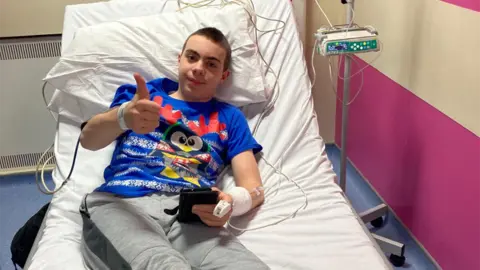Teen receives game-changing diabetes drug
 Family
FamilyA teenage patient has become the first in the UK, a hospital said, to receive what medics call a ground-breaking new drug for the treatment of type 1 diabetes.
Teplizumab can delay the onset of the chronic disease by reprogramming the immune system to stop it mistakenly attacking pancreatic cells which produce insulin.
Sam, 14, from Kings Norton, received the drug at Birmingham Children's Hospital after screening revealed he would go on to develop the condition.
His mother Louise said she was happy he did not need to worry about his blood sugar levels yet.
The family decided to get him screened because his father Chris lives with type 1 diabetes, meaning there is an increased risk of his children developing the disease.
"I know from Sam's dad just how stressful life with type 1 diabetes is, having to constantly monitor your blood sugar and carry insulin with you at all times," Louise said.
"We're so happy that Sam doesn't have to worry about his blood sugar yet, especially while he is doing his GCSEs. He can just be a normal teenager."
 Family
FamilyAccording to Diabetes UK, more than 400,000 people in the UK have type 1 diabetes and there is currently no cure.
It is far more rare than type 2, which accounts for 90% of people living with diabetes, according to the charity.
Past trials have proven that Teplizumab delays insulin-dependent diabetes for up to three years.
Birmingham Children's Hospital said Teplizumab would be prescribed on a case-by-case basis for children who have been recently diagnosed with type 1 diabetes and are at the early stages of the condition.
Diabetes consultant Dr Renuka Dias said: "Being able to delay insulin-dependent diabetes will have a huge impact on a child's life. It means we are letting children have a normal childhood for much longer."
Dr Dias and her team at the Clinical Research Centre have also taken part in pioneering study with the University of Birmingham to screen children aged from three to 13 to find out their risk of developing type 1 diabetes.
They have so far screened more than 20,000 children in the UK in the past two years and are now scaling up throughout Europe.
Follow BBC Birmingham on BBC Sounds, Facebook, X and Instagram.
